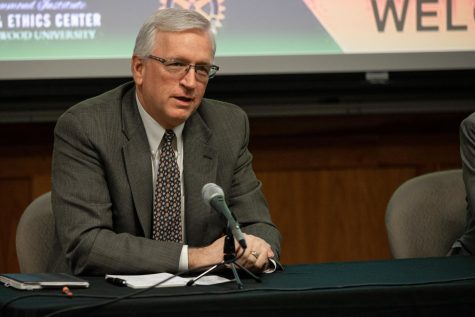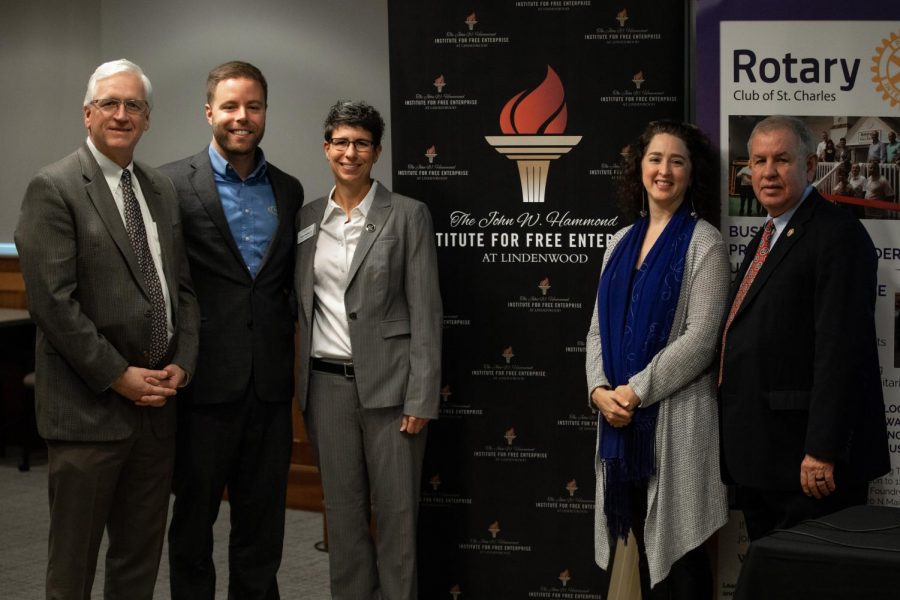LU officials talk about ethical dilemmas at panel discussion
Photo by James Tananan Kamnuedkhun
The Hammond Institute Liberty and Ethics Center and the St. Charles Rotary Club hosted a Business Ethics Panel on Nov. 21. From left to right: John Porter, John Clark, Molly Hudgins, Liberty and Ethics Center Director Rachel Ferguson and Roger Ellis.
November 27, 2019
Harmon Hall was the site of a business ethics panel featuring Lindenwood’s president, John Porter, and two other university officials last Thursday.
John Clark, president and CEO of Masterclock, was the discussion’s moderator, and the panel speakers were Porter, Associate Provost of Curriculum and Experiential Learning Molly Hudgins, and Roger Ellis, the dean of the Plaster School Business and Entrepreneurship.
The discussion focused on real-life ethical dilemmas the panelists have experienced and their firsthand, personal approaches to resolutions.
The event in Dunseth Auditorium was hosted by Rotaract and the Hammond Institute Liberty and Ethics Center. Rotaract is a Rotary Club, designed for young adults to exchange ideas with leaders in the community, promote peace, develop leadership and professional skills, and have fun through service.
Clark opened up the panel by describing the Four Way Test to determine if the things we think, say or do are ethical. It included:
- Is it the truth?
- Is it fair to all concerned?
- Will it build good will and better friendships?
- Will it be beneficial to all concerned?
Afterwards, each panelist was asked to recall an ethical dilemma they have faced as a business professional.

President John Porter speaks at the business ethics panel on Nov. 21.
Porter kicked off the conversation with a story from his time working for IBM in South Africa. He faced a predicament after the CIO and CEO approved a request for proposal from him and IBM, but then the board denied it, allegedly because of under-the-table bribery for 12 million euros.
Porter recounted the situation as one of the most blatantly unethical issues he has encountered.
Following up, Hudgins prefaced her narrative with ethical principles she learned growing up at home.
“Things should be done the right way, not the easy way,” Hudgins said. “And from there, making a decision that will positively impact the majority, not make everyone happy.”
Hudgins described an ethical conflict regarding a student who begged for an interview for an internship with the St. Louis Rams training camp, even though his GPA barely reached 2.0 and he rarely came to class. However, he continued to display a passion for the opportunity.
Hudgins was torn, as her recommendations reflect on Lindenwood and could affect her credibility. She ultimately decided to give the student a chance.
The Rams admired his passion and hired him for the training camp, as well as a four-year-long internship.
Finally, Ellis closed the panel with a story revolving around confidentiality.
Prior to working at Lindenwood, he practiced law. He was once representing a husband in a sticky divorce case, involving a money dispute between the two parties. Days before the court date, the husband called Ellis to explain a resolution to the situation: a shooting at the courthouse.
This put Ellis in a serious pickle. If he spoke up, it could violate attorney-client privilege and laws of professional conduct, and he could lose his license. However, if Ellis didn’t report his client, and there was a shooting, he could have been liable.
Eventually, Ellis spoke to a senior attorney. Due to his client’s prior behavior and criminal history, Ellis had reason to disclose details of the threat to the judge. Thankfully, there was no shooting.








